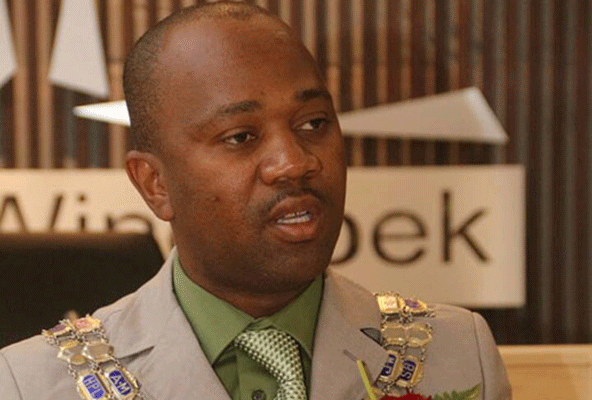THE City of Windhoek will complete the servicing of more than 300 plots at Goreangab Extension 4 early this year, mayor Muesee Kazapua said yesterday.
The Goreangab area had been subjected to illegal invasions since the mass urban land grab that took place in the area in 2014.
Kazapua announced the development last week during the handing-over of N$140 000 collected from the ‘Land-a-Dollar’ campaign in Windhoek to the rural and urban development ministry by former University of Namibia Student Representative Council president Vincent Shimutwikeni.
The money is for helping to finance the massive urban land servicing project (MULSP) that falls under the urban and rural development ministry.
The plots are part of the massive urban land servicing project which started in 2015 after an agreement between government and the Affirmative Repositioning movement.
The agreement seeks to service about 200 000 plots countrywide, while Windhoek, Walvis Bay and Oshakati were identified as pilot sites.
Kazapua said more land would be made available “to address the housing problem”.
“The Goreangab Extension 4 area was the first site where people donated cash for the land-clearing project,” he noted.This effort will also bring an end to the land grabbing activities in the area.
One of the founders of the Affirmative Repositioning movement, Dimbulukweni Nauyoma, yesterday said they appreciate the efforts of the municipality.
He, however, expressed disappointment with the slow pace of servicing the land, saying Oshakati had serviced about 2 000 plots in 18 months.
“It took them [Windhoek] about three years to service 300 plots. This shows that since we pulled out of the project, no meetings had taken place on how the process could be accelerated,” he added.
Nauyoma, however, cautioned the City not to allocate the land “by auctioning the plots to first-time buyers” as was done at Otjomuise Extension 4.
Windhoek must first consider people who have been on the waiting list, together with those who had participated in the mass land application in 2014, he reasoned.
“Windhoek has been problematic when it comes to land servicing and allocations due to their bureaucratic processes. We are anxious about the process of land allocation that will take place after the servicing process is done,” Nauyoma said.
He urged the municipality to also come up with the date on which the plots would be allocated, and that if “they fail to do that”, the AR will organise the masses to enquire about the progress of the 14 000 applications submitted during the mass land application activity in 2014.
The City of Windhoek has an estimated population of close to 400 000 people, and has received close to 30 000 land applications since 2014.
The Namibian reported last year that the housing demand was increasing by 10 000 new applications per year, while the housing waiting list was also estimated by government officials to be over 130 000 last year.
Rural and urban development minister Sophia Shaningwa last year told parliament that about 26 700 plots were serviced across the country (by all local authorities) since 2014.
She said the 26 700 plots were serviced through the combined efforts of government, local authorities and private partnerships, and these were above the target set under the Harambee Prosperity Plan, which only aimed to service 26 000 plots. However, the minister added that during the first year of the massive urban land servicing project (2016/17), only 2 061 plots were fully serviced in the pilot towns since government adopted the project in 2015.
Of the 26 700 serviced plots Shaningwa referred to, 371 plots were in Windhoek (Academia and Otjomuise), while 920 were at Walvis Bay, 2 084 at Swakopmund and over 2 200 at Oshakati.
The Ondangwa Town Council also serviced 420 plots during that time, and had planned to service 900 more since 2016.
According to Shaningwa, Katima Mulilo serviced about 2 024 plots, while another 1 009 were serviced at Keetmanshoop, 531 at Otjiwarongo, 593 at Grootfontein and 312 at Tsumeb. The Affirmative Repositioning movement has pulled out of the massive urban land servicing project.
Stay informed with The Namibian – your source for credible journalism. Get in-depth reporting and opinions for
only N$85 a month. Invest in journalism, invest in democracy –
Subscribe Now!







